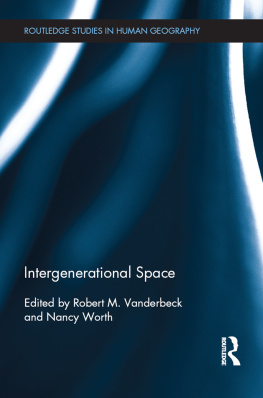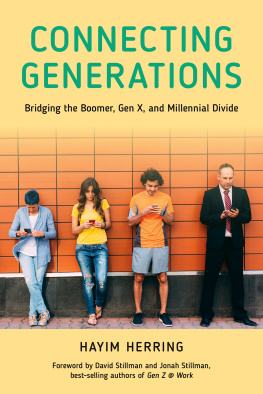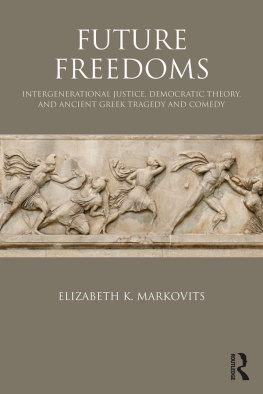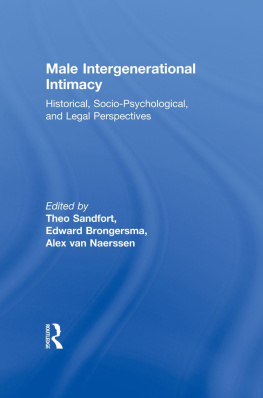
Intergenerational Space
Intergenerational Space offers insight into the transforming relationships between younger and older members of contemporary societies. The chapter selection brings together scholars from around the world in order to address pressing questions about both the nature of contemporary generational divisions as well as the complex ways in which members of different generations are (and can be) involved in each others lives. These questions include: how do particular kinds of spaces and spatial arrangements (e.g. cities, neighbourhoods, institutions, leisure sites) facilitate and limit intergenerational contact and encounters? What processes and spaces influence the intergenerational negotiation and contestation of values, beliefs and social memory, producing patterns of both continuity and change? And if generational separation and segregation are in fact significant social problems across a range of contexts as a significant body of research and commentary attests how can this be ameliorated? The chapters in this collection make original contributions to these debates drawing on original research from Belgium, China, Finland, Poland, Senegal, Singapore, Tanzania, Uganda, the United States and the United Kingdom.
Robert M. Vanderbeck is Senior Lecturer in Human Geography at the University of Leeds, UK. His research focuses on contemporary processes of social exclusion and inclusion, with particular emphases on childhood, youth and intergenerational relations; sexualities; religion; and urban public spaces. His work has been published in numerous journals including Annals of the AAG, Transactions of the IBG, Urban Geography, Urban Studies, Religion, Sexualities and Childrens Geographies.
Nancy Worth is a Banting Fellow in the School of Geography and Earth Sciences at McMaster University, Canada. Her current research examines work and social life with millennial women. She has published on temporality, sociality, mobilities, lifecourse research praxis and young peoples transition to adulthood in journals such as Area, Geoforum, the Journal of Geography in Higher Education, Social & Cultural Geography and Urban Studies.
Routledge studies in human geography
This series provides a forum for innovative, vibrant and critical debate within Human Geography. Titles will reflect the wealth of research which is taking place in this diverse and ever-expanding field. Contributions will be drawn from the main sub-disciplines and from innovative areas of work which have no particular sub-disciplinary allegiances.
Published:
1 A Geography of Islands
Small island insularity
Stephen A. Royle
2 Citizenships, Contingency and the Countryside
Rights, culture, land and the environment
Gavin Parker
3 The Differentiated Countryside
Jonathan Murdoch, Philip Lowe, Neil Ward and Terry Marsden
4 The Human Geography of East Central Europe
David Turnock
5 Imagined Regional Communities
Integration and sovereignty in the global south
James D. Sidaway
6 Mapping Modernities
Geographies of Central and Eastern Europe 19202000
Alan Dingsdale
7 Rural Poverty
Marginalisation and exclusion in Britain and the United States
Paul Milbourne
8 Poverty and the Third Way
Colin C. Williams and Jan Windebank
9 Ageing and Place
Edited by Gavin J. Andrews and David R. Phillips
10 Geographies of Commodity Chains
Edited by Alex Hughes and Suzanne Reimer
11 Queering Tourism
Paradoxical performances at Gay Pride parades
Lynda T. Johnston
12 Cross-Continental Food Chains
Edited by Niels Fold and Bill Pritchard
13 Private Cities
Edited by Georg Glasze, Chris Webster and Klaus Frantz
14 Global Geographies of Post-Socialist Transition
Tassilo Herrschel
15 Urban Development in Post-Reform China
Fulong Wu, Jiang Xu and Anthony Gar-On Yeh
16 Rural Governance
International perspectives
Edited by Lynda Cheshire, Vaughan Higgins and Geoffrey Lawrence
17 Global Perspectives on Rural Childhood and Youth
Young rural lives
Edited by Ruth Panelli, Samantha Punch, and Elsbeth Robson
18 World City Syndrome
Neoliberalism and inequality in Cape Town
David A. McDonald
19 Exploring Post-Development
Aram Ziai
20 Family Farms
Harold Brookfield and Helen Parsons
21 China on the Move
Migration, the state, and the household
C. Cindy Fan
22 Participatory Action Research Approaches and Methods
Connecting people, participation and place
Edited by Sara Kindon, Rachel Pain and Mike Kesby
23 Time-Space Compression
Historical geographies
Barney Warf
24 Sensing Cities
Monica Degen
25 International Migration and Knowledge
Allan Williams and Vladimir Bal
26 The Spatial Turn
Interdisciplinary perspectives
Edited by Barney Warf and Santa Arias
27 Whose Urban Renaissance?
An international comparison of urban regeneration policies
Edited by Libby Porter and Katie Shaw
28 Rethinking Maps
Edited by Martin Dodge, Rob Kitchin and Chris Perkins
29 RuralUrban Dynamics
Livelihoods, mobility and markets in African and Asian frontiers
Edited by Jytte Agergaard, Niels Fold and Katherine V. Gough
30 Spaces of Vernacular Creativity
Rethinking the cultural economy
Edited by Tim Edensor, Deborah Leslie, Steve Millington and Norma Rantisi
31 Critical Reflections on Regional Competitiveness
Gillian Bristow
32 Governance and Planning of Mega-City Regions
An international comparative perspective
Edited by Jiang Xu and Anthony G.O. Yeh
33 Design Economies and the Changing World Economy
Innovation, production and competitiveness
John Bryson and Grete Rustin
34 Globalization of Advertising
Agencies, cities and spaces of creativity
James R. Faulconbridge, Peter J. Taylor, Jonathan V. Beaverstock and Corinne Nativel
35 Cities and Low Carbon Transitions
Edited by Harriet Bulkeley, Vanesa Castn Broto, Mike Hodson and Simon Marvin
36 Globalization, Modernity and the City
John Rennie Short
37 Climate Change and the Crisis of Capitalism
A chance to reclaim self, society and nature
Edited by Mark Pelling, David Manual Navarette and Michael Redclift
38 New Economic Spaces in Asian Cities
From industrial restructuring to the cultural turn
Edited by Peter W. Daniels, Kong Chong Ho and Thomas A. Hutton
39 Landscape and the Ideology of Nature in Exurbia
Green sprawl
Edited by Kirsten Valentine Cadieux and Laura Taylor
40 Cities, Regions and Flows
Edited by Peter V. Hall and Markus Hesse
41 The Politics of Urban Cultural Policy
Global perspectives
Edited by Carl Grodach and Daniel Silver
42 Ecologies and Politics of Health
Edited by Brian King and Kelley Crews
43 Producer Services in China
Next page





